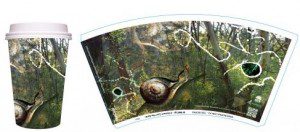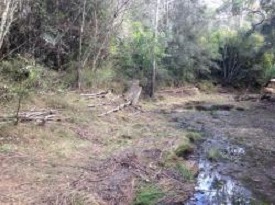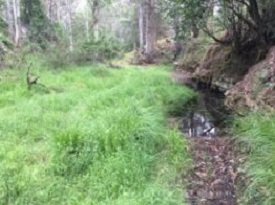 The aim was to use art on a paper coffee cup to start a local conservation conversation to help preserve vital woodlands in a Rosemeadow reserve.
The aim was to use art on a paper coffee cup to start a local conservation conversation to help preserve vital woodlands in a Rosemeadow reserve.
The recyclable coffee cup – certified carbon neutral – is the main vehicle of this unusual project.
But there’s more to it than that.
The cups may be the main vehicle but the most important members of the project are students from the Dorchester School that operates in the Reiby Juvenile Justice Centre at Airds.
The cups have been printed with the students’ artwork and will be distributed to coffee shops across Campbelltown, free of charge, with the aim of prompting coffee lovers to find out more about their local environment.
Especially the importance of preserving critically endangered Cumberland Plain Woodland within Noorumba Reserve, Rosemeadow.
The project is a joint effort with Campbelltown City Council.
Mayor of Campbelltown, Cr Paul Hawker, said council was committed to working with local young people to help encourage active involvement in their community and foster environmental stewardship.
“Projects like this inspire young residents to get involved in local conservation projects and gain an appreciation and understanding of our natural environment.
[social_quote duplicate=”no” align=”default”]“The students’ design aims to communicate the rich biodiversity and Indigenous values associated with the reserve,” Cr Hawker said.[/social_quote]
Noorumba Reserve supports one of the largest remaining stands of Cumberland Plain Woodland in public ownership.
The reserve provides habitat for threatened species such as the Cumberland Plain Land snail and koala, supports 39 plant species of regional significance, and contains culturally significant Aboriginal heritage artefacts.
Council was successful in receiving a $30,000 grant from Greater Sydney Local Land Services to implement a biodiversity conservation project to improve the integrity and resilience of an area along Menangle Creek within the reserve.
The area was identified as being invaded by noxious weeds – mostly African Olive and Privet – having highly eroded creek banks and facing severe impacts from tree dieback.
The conservation project involved removal of the noxious weed infestations, bank stabilisation, ecological fire hazard reduction works to promote biodiversity and revegetation activities.
On ground works commenced in July last year and are expected to be completed in early 2016.
For more information, visit the Riparian Works Project website here.


